|
|
|
Sort Order |
|
|
|
Items / Page
|
|
|
|
|
|
|
| Srl | Item |
| 1 |
ID:
129477
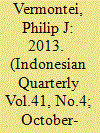

|
|
|
|
|
| Publication |
2013.
|
| Summary/Abstract |
The year 2013 has been seen as a prelude to the so-called political year of 2014. One of the weirdest political scenes in 2013 was when political parties had to advertise in the media in order to find people to
be listed as their candidates for the parliamentary election. Moreover, the parties had to rush in recruiting the candidates to meet deadlines for names submission set out by the Indonesian Election Commission KPU). This can be understood as a symptom of how dysfunctional our political parties are. Party recruitment and training program are indicators of whether or not a political party is well-functioning. A political party has to be ready with its recruitment process immediately after an election is done. It has to start all internal political process right away. By doing so, those who lost in the election will be able to quickly regroup while the winner consolidates. But what we saw in such an advertisement in the media simply reinforces the image
widely held by the public that politicians and /or political parties are just regular job seekers. Politicians are no longer thought of as noble individuals. Politics then become an arena which good people do not intend to enter.
|
|
|
|
|
|
|
|
|
|
|
|
|
|
|
|
| 2 |
ID:
164758
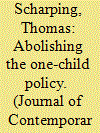

|
|
|
|
|
| Summary/Abstract |
Based on a documentary, statistical and discourse analysis, plus 30 years of interviewing in China, this article investigates the demo-political background of China’s return to a two-child policy in 2015. It pinpoints the contested core issues that fueled a bitter polemic on the future course of Chinese birth policy and continue to fester in ongoing controversies. The article briefly reviews earlier challenges to China’s controversial one-child policy since its inception in 1979/80, details the conflicts and mechanisms shaping the birth planning regime since 2000, and examines the role played by academic counseling, bureaucratic infighting, lobbying and civil society in the about-turn. Comparing birth planning to other policy arenas, it concludes with a discussion of societal and think-tank impact on Chinese political decision-making.
|
|
|
|
|
|
|
|
|
|
|
|
|
|
|
|
| 3 |
ID:
123655
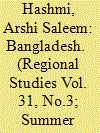

|
|
|
| 4 |
ID:
133167
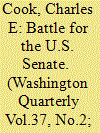

|
|
|
|
|
| Publication |
2014.
|
| Summary/Abstract |
The battle for control of the U.S. House of Representatives was over before it even started, but the fight for control of the U.S. Senate is proving to be a knock-down, drag-out affair that could easily go either way.
Control of the U.S. House is pretty much a settled affair. Republicans occupy 93 percent of the congressional districts that GOP presidential nominee Mitt Romney carried in 2012, and Democrats hold 96 percent of the districts that Obama won. As a result, there are very few "fish out of water," or Republicans sitting in Democratic-leaning districts or Democrats in GOP-tilting districts. Yes, there are a large number of open House seats this cycle, but most are in districts which safely belong to one side or the other. It would seem that the next realistic shot Democrats have at winning control of the House would come in 2022, after the next round of redistricting takes place in 2021. The 2018 and 2020 gubernatorial and state legislative elections will determine which party in each state has the dominant hand in the redistricting process. Republicans had it in most states in 2011, and Democrats want it badly in 2021.
|
|
|
|
|
|
|
|
|
|
|
|
|
|
|
|
| 5 |
ID:
075215
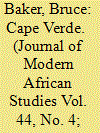

|
|
|
|
|
| Publication |
2006.
|
| Summary/Abstract |
This article examines the substance behind the claim that Cape Verde, a small archipelago state off the west coast of Africa, is the best country in Africa for political rights and civil liberties. Based on interviews conducted with 22 key informants in government, the judiciary, the legislature and civil society, it explores the electoral process, the political parties, the functioning of the National Assembly, civil and political rights, the judicial system, civil society and economic equality. It finds that Cape Verde's unique geography and history have played a key role in facilitating good governance, and an open and non-violent society that values the real political gains of 1991. However, democracy has not yet eradicated either gender discrimination, dependence on the diaspora or poverty.
|
|
|
|
|
|
|
|
|
|
|
|
|
|
|
|
| 6 |
ID:
119715
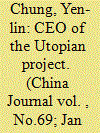

|
|
|
| 7 |
ID:
132792
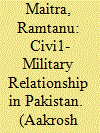

|
|
|
|
|
| Publication |
2014.
|
| Summary/Abstract |
A significant number of countries around the world have been stuck a cycle of military rule followed by civilian rule followed by military rule for decades. The cycle is seemingly unbreakable because both groups, for their own reasons, reject a fully mature political process. Many of the countries with this pattern of governance are located in South America and Africa. But Asia host at least two such nations, densely populated countries of Pakistan and Indonesia.
|
|
|
|
|
|
|
|
|
|
|
|
|
|
|
|
| 8 |
ID:
134066
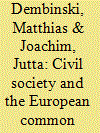

|
|
|
|
|
| Publication |
2014.
|
| Summary/Abstract |
The involvement of civil society organizations (CSOs) is widely regarded by students of the EU's domestic policy fields as enhancing transparency and accountability and, more generally, the democratic quality of political processes. This article explores the contribution of CSOs to the EU's Common Security and Defence Policy and assesses whether a democracy-enhancing effect of their involvement can also be demonstrated for this policy field. We analyse the contribution of CSOs based on two common models of democracy: the intergovernmental and the supranational model of democracy. We find that CSOs are indeed quite actively involved in the EU's security policy. With regard to their democracy-enhancing effects, however, our findings are rather mixed. While the engagement of CSOs does provide a remedy for the democratic deficits associated with intergovernmental decision-making, these organizations do not fully meet the demands posed by supranational governance.
|
|
|
|
|
|
|
|
|
|
|
|
|
|
|
|
| 9 |
ID:
166212
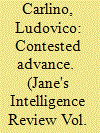

|
|
|
| 10 |
ID:
111633
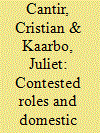

|
|
|
|
|
| Publication |
2012.
|
| Summary/Abstract |
Many of the strengths of research in Foreign Policy Analysis have been overlooked by role theorists. Role theorists often assume that roles are shared across elites and masses, that elites can manipulate masses, or that public opinion on roles constrains elites. Role theorists also tend to assume that there is a consensus among elites over national roles. Research in Foreign Policy Analysis, on the other hand, demonstrates that foreign policy may be contested both vertically (between elites and masses) and horizontally (among elites) and that these conflicts affect foreign policy decision making and foreign policy behavior. We propose that (i) contested roles mean that roles and foreign policy are not as stable as is often implied; (ii) research on contested roles offers Foreign Policy Analysis a less preference-oriented way of conceptualizing policy disagreements and decision making; and (iii) structures reveal themselves as important when agents use them in domestic discourse over contested roles, but the impact of international norm and role structures is not automatic, as it is shaped by the agents (and domestic structures) in the domestic political process. We suggest that research on the strategic use of roles could bring together these benefits of examining contested roles.
|
|
|
|
|
|
|
|
|
|
|
|
|
|
|
|
| 11 |
ID:
119557
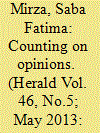

|
|
|
| 12 |
ID:
130526
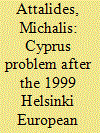

|
|
|
|
|
| Publication |
2014.
|
| Summary/Abstract |
This essay attempts to assess the consequences of the so-called Helsinki Strategy since its creation at the Helsinki European Council of December 1999. It analyzes the strategy's interrelations with other processes involved in developments related to the Cyprus problem. Despite the fears and criticisms expressed at the time and the complex of events and processes that followed, the decisions affecting Cyprus, Turkey, and Greece at the Helsinki Council reflected a degree of "Europeanization" of a conflict situation. It is also argued that the contents of the Annan Plan for Cyprus's reunification and the outcomes of the referenda on that plan in 2004 are not the results of the Helsinki Strategy but have a different origin.
|
|
|
|
|
|
|
|
|
|
|
|
|
|
|
|
| 13 |
ID:
132968
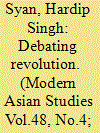

|
|
|
|
|
| Publication |
2014.
|
| Summary/Abstract |
This paper examines the public debate that happened among Delhi's Sikh community following the formation of the Khalsa by Guru Gobind Singh. The detail of this debate was expressed in the early eighteenth century Sikh text, Sri Gur Sobha. The Sri Gur Sobha explains how Delhi's Sikhs became divided into pro-Khalsa and anti-Khalsa factions, and how this conflict resulted in a campaign of persecution against Delhi's Khalsa Sikhs. In this paper I endeavour to analyse exactly why this dispute occurred and how it reflects wider political and socio-economic processes in early modern India and Sikh society. In addition, the paper will explore how the elite Khatri community consequently became an object of hatred in eighteenth century Khalsa Sikh literature.
|
|
|
|
|
|
|
|
|
|
|
|
|
|
|
|
| 14 |
ID:
110333
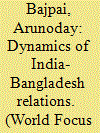

|
|
|
| 15 |
ID:
113122
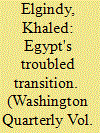

|
|
|
| 16 |
ID:
108738
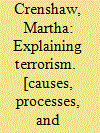

|
|
|
|
|
| Publication |
London, Routledge, 2011.
|
| Description |
xii, 268p.
|
| Standard Number |
9780415780513
|
|
|
|
|
|
|
|
|
|
|
|
Copies: C:1/I:0,R:0,Q:0
Circulation
| Accession# | Call# | Current Location | Status | Policy | Location |
| 056375 | 363.325/CRE 056375 | Main | On Shelf | General | |
|
|
|
|
| 17 |
ID:
126853
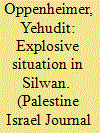

|
|
|
|
|
| Publication |
2011.
|
| Summary/Abstract |
If there is one area in the country where state control should develop, plan, manage and preserve, it is this area of the historic City of David." That is what the Israeli Antiquities Authority wrote in a letter to the attorney general. And they were not alone in this opinion. The City of David is located a few dozen meters from the Temple Mount, in the heart of the crowded Palestinian neighborhood of Silwan
|
|
|
|
|
|
|
|
|
|
|
|
|
|
|
|
| 18 |
ID:
143261
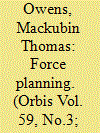

|
|
|
|
|
| Summary/Abstract |
While force planners must think about what the future security environment might look like, what technologies might be available, and how future forces might leverage these emerging technologies to meet the challenges of a future security environment, they must always be cognizant of domestic structural factors. The author argues that a force planner must always be guided by a coherent strategic logic. Structural factors can never be eliminated but a strong strategic rationale can minimize them.
|
|
|
|
|
|
|
|
|
|
|
|
|
|
|
|
| 19 |
ID:
133471
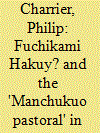

|
|
|
|
|
| Publication |
2014.
|
| Summary/Abstract |
The art photography of Fuchikami Hakuy? and his circle in Japanese Manchuria is commonly and benignly treated as hybridized modernism, a product of the bending of conventional 1930s Japanese styles (pictorialist, constructivist, realist) through contact with the unfamiliar and the exotic. As such it is deemed reflexive in relation to the stimuli of a new land and peoples, but disconnected from the political, economic, and social processes of imperialism and colonialism in Northeast China. The following article uses both structuralist and post-structuralist theoretical approaches to challenge this interpretation, arguing that through the skilful erasure of colonial violence and disruption, the lyrical images of villages, agriculturalists, and factories produced by Fuchikami and his Mansh? Shashin Sakka Ky?kai (Manchuria Photographic Artists Association) participate directly in processes of state construction in Manchukuo. The development of a quasi-documentary pastoral aesthetic by Fuchikami and the Manchuria photographers is given close attention in the analysis, particularly as it relates to the influence of French Barbizon school painting on late nineteenth- and early twentieth-century Japanese art.
|
|
|
|
|
|
|
|
|
|
|
|
|
|
|
|
| 20 |
ID:
124881
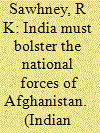

|
|
|
|
|
| Publication |
2013.
|
| Summary/Abstract |
If India has to stay relevant in Afghanistan, it must do all to bolster the national forces of Afghanistan. This can be done by combining India's considerable soft power with that of other regional countries, and pool together diplomatic, political, and military resources with other countries to support Afghanistan's war against disruptive forces. Banking only on things like an UN-mandated international security force or a regional treaty which forswears interference in Afghanistan, is a futile game because it will have no worthwhile mechanism for enforcement.
|
|
|
|
|
|
|
|
|
|
|
|
|
|
|
|
|
|
|
|
|